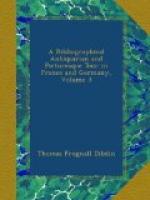The next morning I visited the Comte Drechsel—having first written him a note, and gently touched upon the point at issue. He received me with courtesy; and I found him particularly intelligent—but guarded in every expression connected with any thing like the indulgence, even of a hope, of obtaining the precious volume in question. He would submit my proposition to the municipality. He understood English perfectly well, and spoke French fluently. I had received intimation of a collection of rare and curious old books, belonging to a Mr...., in the environs of Ansbach; who, having recently experienced some misfortunes, had meditated the sale of his library. The owner had a pretty country house, scarcely a stone’s throw from the outskirts of the town, and I saw his wife and children—but no books. I learnt that these latter were conveyed to the town for the purpose of sale; and having seen a few of them, I left a commission for a copy of Fust and Schoeffher’s edition of Pope Boniface’s Councils of 1465, UPON VELLUM. I have never heard of the result of the sale.
From Ansbach to Heilbronn, which can be scarcely less than sixty English miles, few things struck me on the road more forcibly than the remains of a small old church and cloisters at Feuchtwang—where we stopped to change horses, the first stage after Ansbach. It rained heavily, and we had only time to run hastily through these very curious old relics, which, if appearances formed the test of truth, might, from the colour of the stone and the peculiarity of the structure, have been old enough to designate the first christian place of worship established in Germany. The whole, however, was upon a singularly small scale. I earnestly recommend every English antiquary to stop longer than we did at Feuchtwang. From thence to Heilbronn, we passed many a castle-crowned summit, of which the base and adjacent country were covered by apparently impenetrable forests of fir and elm; but regretted exceedingly that it was quite nightfall when we made the very steep and nervous entrance into Hall—down a mountainous descent, which seemed to put the carriage on an inclined plane of forty-five degrees. We were compelled to have four horses, on making the opposite ascent; and were even preceded by boys, with links and torches, over a small bridge, under which runs a precipitous and roaring stream. Hall is a large, lively, and much frequented town.
Heilbronn, or Hailbrunn, is a large consequential town; and parts of it are spacious, as well as curious from appearances of antiquity. The large square, where we changed horses, was sufficiently striking; and the Hotel de ville in particular was worthy of being copied by the pencil of my companion. But we were only passing travellers, anxious to reach Manheim and to cross the Rhine. The country about Heilbronn is picturesque and fertile, and I saw enough to convince me that two days residence there would not be considered as time thrown away. It is one of the principal towns in the kingdom of Wirtemberg, and situated not many leagues from the Black Forest, or Schwartz Wald, where wild boars and other wild animals abound, and where St. Hubert (for aught I know to the contrary) keeps his nocturnal revels in some hitherto unfrequented glen ... beneath the radiance of an unclouded moon.




